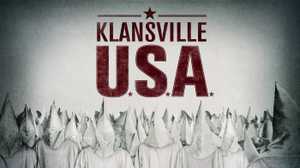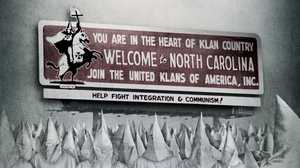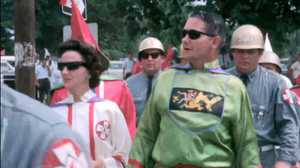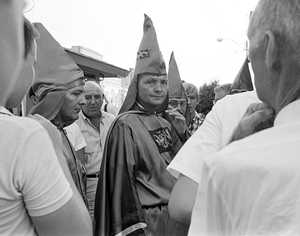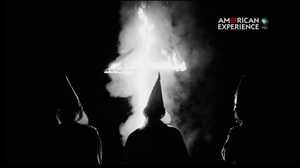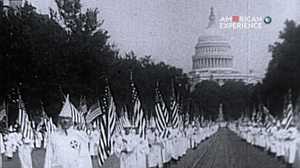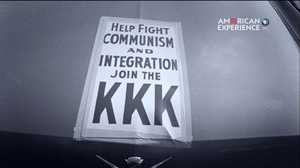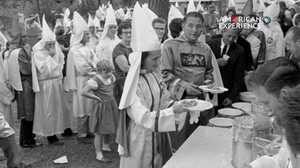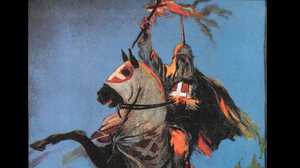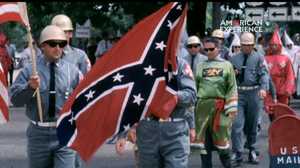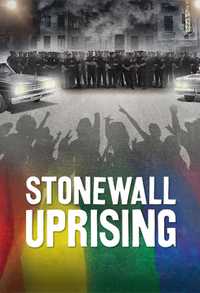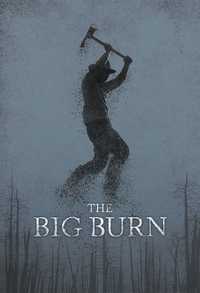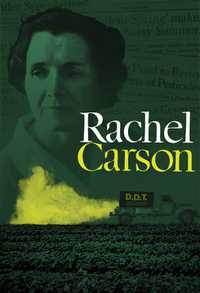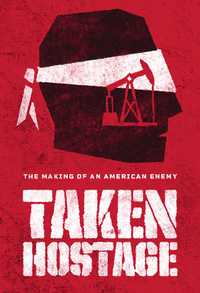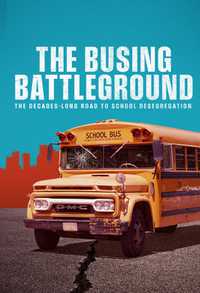Narrator: The rally was scheduled for the afternoon of August 14th 1966. For hours, the crowd kept growing outside Memorial Auditorium in Raleigh, North Carolina. Hundreds of police surrounded the building, intent on maintaining order at what would be the state's largest political gathering of the year. The rally had been called by the United Klans of America, as a show of support for Klan leaders being investigated by congress and the FBI.
The state's head klansman, Grand Dragon Bob Jones, was facing a possible prison sentence. The future of the Ku Klux Klan itself was on the line.
David Cunningham, Author, Klansville, U.S.A.: Jones's dream was really to build the Klan into something that had political legitimacy. He also understood that both the Klan's goals, and to some degree its appeal really relied upon its militance as well.
Narrator: As hecklers began taunting a group of black activists in the balcony, Jones ordered them to stop. "Quit playing with them niggers," he commanded.
Bob Jones was the most successful Grand Dragon in the country. In just three years, he had grown the North Carolina Klan from a handful of friends to some 10,000 members -- more than the Klans of all other southern states combined. In the process, Jones had helped give the most progressive state in the south a new nickname: "Klansville, USA."
Rob Christensen, Reporter: There was really no politicians during the 1960s that were really voicing concerns of North Carolina's white working class and especially those people who were really concerned about racial integration.
Michael Frierson, Filmmaker, FBI KKK: So, who's going to speak for frustrated, poor white folks who see integration as a threat to their job, to their way of life? The Klan becomes the organization that can be the spokesperson for people who perceive their way of life to be under threat.
Bunny Sanders, Mayor, Roper, N.C.: We had NAACP. They had the Klan. They had Klan.
Narrator: The son of a railroad worker, Bob Jones grew up just outside Salisbury, 40 miles north of Charlotte. The fifth of eight children, he had dropped out of high school in either the 10th or 11th grade -- no one knows for sure. He was discharged from the navy after refusing to salute a black officer. "I'd salute that uniform all day long," Jones said, "but I won't salute no nigger."
For years, he bounced from job to job, awning salesman, bricklayer, lightning rod salesman. He struggled to make a decent living.
Patsy Sims, Author: Many people probably did refer to him, maybe in front of him, as white trash, and that may well also have been part of the bruising that led him to feel as strong racially as he did.
Gary Freeze, Historian: What the age of segregation actually promoted was a group of people who essentially found a niche above blacks but below successful whites. Bob Jones represented those North Carolinians.
Ned Cline, Reporter: He would never admit being a racist. He didn't object to Jews, he didn't object to black people as long as they stayed in their place and away from him and never tried to mingle together with white people.
Narrator: The Ku Klux Klan originated in the wake of the nation's greatest trauma -- the civil war. In 1865, decommissioned confederate officers in Pulaski, Tennessee, formed a fraternal social club. They called themselves the Ku Klux Klan, from the Greek word for circle, "kuklos."
Mark Potok, Southern Poverty Law Center: It was essentially a club where they were going to pull pranks. They started to dress up in very elaborate costumes and go out and try to terrorize freed slaves. They would pose as confederate officers come back from the dead.
Patsy Sims, Author : The story goes they first did it innocently, and then when they saw the reaction of the newly freed slaves who were petrified, the word got around that they were having this effect, and that's when that version of that version of the Klan became increasingly violent.
Mark Potok, Southern Poverty Law Center: The reality is, is that the Klan of Reconstruction spent its time murdering people, throwing people off bridges, hanging them from trees.
Narrator: When the federal government clamped down in 1871, the Klan dissolved and lay dormant for decades.
Then in 1915, the image of the Ku Klux Klan was seared into the nation's consciousness by the first true blockbuster in American cinema: DW Griffith's three-hour epic, "The Birth of a Nation."
Based on a bestselling novel, the movie portrayed Klan violence as justifiable and necessary to restore order to a South in chaos while celebrating Klan efforts to keep blacks from exercising their newly granted right to vote.
Mark Potok, Southern Poverty Law Center: This film so romanticized the Klan that the Klan pictured itself and described itself as heroically standing up for the oppressed white people, the dispossessed white people of the South.
Narrator: "The Birth of a Nation" sparked a revival of the Ku Klux Klan in the 1920s. The Klan's ideology of white supremacy and what they called "100% Americanism" resonated across the country.
Mark Potok, Southern Poverty Law Center: The Klan of the 1920s was not a rural Klan, which the Klan of Reconstruction had primarily been. The Klan of the 1920s was very big in surprising places, places like Denver, like Portland, Detroit, which had huge waves of immigration both of Catholics from Europe and of African Americans coming from the South.
Narrator: In 1925, 50,000 klansmen and women gathered in Washington in a vivid display of their numbers. Four million Americans claimed Klan membership.
Patsy Sims, Author: That particular klan also became very, very powerful politically. They elected at least 10 governors, and there were all sorts of public officials who were elected by power of the Klan.
David Cunningham, Author, Klansville, U.S.A.: The Klan has a great rise in terms of membership through the first half of the 1920s, and it has an equally spectacular fall. There were a number of exposés of what the Klan was doing in terms of its violent underside. When you throw scandals in that really embarrass the leaders, that kind of publicity really eroded its credibility.
Narrator: By the 1930s, bad press and power struggles had ripped apart the once powerful Klan. But not for long. When the U.S. Supreme Court ruled in 1954 that public schools must integrate the Klan rose once again.
Mark Potok, Southern Poverty Law Center: Brown v. Board of Education was the opening shot in the civil rights era and although it didn't happen right away, it really presaged huge, huge changes in the South.
Narrator: In 1960, sit-ins at lunch counters in Greensboro, North Carolina, sparked similar demonstrations across the South. Officials in other states reacted defiantly as the civil rights movement gained momentum.
George Wallace, Segregationist (Archival): …and I say segregation now, segregation tomorrow, and segregation forever
Michael Frierson, Filmmaker: You have governors like George Wallace openly advocating segregation, openly taking the position that the Klan might have taken in that state. In North Carolina, we didn't have that.
Narrator: Bob Jones feared that North Carolina's leaders would not resist the push for integration. In the summer of 1963, he petitioned the United Klans of America for a charter to organize in his home state.
Bob Jones (archival): Everybody in this country is organized except the white protestant gentile. Your niggers have your NAACP and CORE. You got B'nai B'rith for your Jewish people. Your Knights of Columbus which is a secret, fraternal order, but the white protestant gentile, the only hope, the only salvation that they have left in the United States today is the United Klans of America, Incorporated. We've saved the South twice, or the Klan has, and it looks like we're going to just have to do it again.
Bunny Sanders, Mayor, Roper, N.C.: It was a time when poor white people found themselves in a real strange space because they saw black people progressing and they saw themselves not being paid any attention to. And wealthier white people looked down on them. I mean, they really did. It was all about not being at the bottom of the barrel.
Narrator: On August 17th, Jones was chosen to be their first grand dragon.
Patsy Sims, Author: That was the biggest thing in his life. It's probably the biggest thing that ever happened to him. I mean this was like his birthday.
David Cunningham, Author, Klansville, U.S.A.: Bob Jones's father was a Klan member in the 1920s. He would say that his mother proudly marched in a Klan parade when she was seven months pregnant with Bob. So he sort of saw it as a birthright in some ways, and something that was kind of in his blood and in his family.
Narrator: Just 11 days later, the march on Washington displayed the growing strength of the civil rights movement.
Rev. Martin Luther King, Jr. (archival): …We will be able to speed up that day when all of God's children, black men and white men, Jews and Gentiles, Protestants and Catholics, will be able to join hands and sing in the words of the old Negro spiritual: "Free at last! Free at last! Thank God Almighty, we are free at last!"
Narrator: "We have the same right as the negro to demonstrate," Jones declared. On August 31, he held a rally in a cornfield near his hometown, hoping to attract a few hundred people. Two thousand showed up.
Patsy Sims, Author: These people were so afraid that they were going to have even less than what they already had, because the black man was going to take their rights, and civil rights workers were starting to come down south. And so some of these people felt they were being invaded. Emotions ran high.
Michael Frierson, Filmmaker: Bob Jones realized, "We can take this show on the road. We can grow this business that we've got. We can travel across the state and present this message all over."
Narrator: That fall, Jones threw himself into a massive recruiting campaign. Crisscrossing the state in his old Plymouth, he established local chapters, called klaverns, in every corner of North Carolina, signing up hundreds of new members. One of the recruits was a house painter and ordained Baptist minister named George Dorsett.
Michael Frierson, Filmmaker: Dorsett's dad was a Klansman. When he was seven years old, his father burned a cross in Dorsett's back yard. I mean, I think he wanted to bring his kids into the fold, and he did a good job with Dorsett.
Narrator: Dorsett would soon become the klan's official chaplain, or imperial klud, preaching at nearly every rally in the state.
Michael Frierson, Filmmaker: George Dorsett is deeply religious and saw becoming a preacher as a way to better himself. He started off with benches and a tent. And then if you're good at it, you want to move up; you want to have a bigger congregation, you want to have a bigger church. He becomes a preacher. He becomes a preacher in the klan. You know, George is always ambitious, I think.
Narrator: Dorsett's powerful sermons complemented Jones's organizational skills. They were a perfect duo, at least in the beginning.
Slate: The Andy Griffith Show
Announcer: The Andy Griffith Show!
Narrator: One of the most popular television shows of 1963 was set in North Carolina, in the fictional town of Mayberry.
Andy Griffith, The Andy Griffith Show (archival): You did do all right!
Howard McNear, The Andy Griffith Show (archival): Sure, three trout and two perch!
Andy Griffith, The Andy Griffith Show (archival): Yeah, together with what me and Opie got we can have a fine fish fry!
Gary Freeze, Historian: Mayberry itself was a metaphor of what North Carolina had thought of itself for an entire generation.
Andy Griffith, The Andy Griffith Show (archival): Hi Aunt Bee.
Frances Bavier, The Andy Griffith Show (archival): Hi Andy.
Gary Freeze, Historian: North Carolina always saw itself as a network of small communities ruled by the Andy Taylors of the world…
Andy Griffith, The Andy Griffith Show (archival): What in the world are you all trying to do?
Gary Freeze, Historian: …small-town local notables who behaved more like the Justice of the Peace than the sheriff. There's always a peaceful resolution to what could be volatile conflict.
Don Knotts, The Andy Griffith Show (archival): Let's move along. You're congregatin' unlawfully!
Gary Freeze, Historian: Mayberry is a town that has no racial issues. Black people walk around and are part of the community, but they never speak up and disrupt. That's what North Carolinians saw as the kind of race relations they wanted. You're sorted and you're identified, but don't rattle that system.
Narrator: By the 1960s, however, the world of Mayberry was slipping away. North Carolina had become the shining light of what was called "the new South" -- a region that was growing, and moving out of the shadow of its tense racial past. State leaders navigated a middle path through the changing racial landscape. They called it "The North Carolina Way."
David Cunningham, Sociologist: This was a sense that North Carolina is a place that, through the goodwill of its people, is going to be willing to gradually change and transform its system of race relations. Not that there would be a law passed and the change would have to happen tomorrow.
Gary Freeze, Historian: North Carolina's moderate self-image in terms of race relations is based upon a long, sustained effort in the 20th century to be more progressive than the rest of the South, not to change the basic dynamics of race relations, but to pursue them in a moderate form that isn't particularly confrontational.
Narrator: Gradual change wasn't acceptable to staunch segregationists or civil rights activists, and as the 1960's progressed, blacks intensified their demands for equality.
Bunny Sanders, Mayor, Roper, N.C.: I remember late at night sometimes at my house, we would be awakened with my father cursing white people out. But that's what he did in his sleep. He had so much bottled up into him that he had gone through and taken. But getting into the 60s, around '64, the civil rights movement is now beginning to really rev up. You're seeing more political power. You're seeing blacks pursuing public office. White people are having to say, "They're going to run for office? We're going to have a black councilman?" You know, "That possibility exists?"
David Cunningham, Sociologist: So in North Carolina, you knew, if you were a white citizen who wanted to maintain segregation, you couldn't count on your political leadership. And so, the Klan steps in and says, "We are the only organization that will support white people in North Carolina." What Bob Jones would be talking about are these people who lived a very traditional way of life in predominantly rural areas that were being left out of this whole discourse about the New South.
Narrator: In the summer of 1964, Bob Jones held scores of rallies, open to whites only, across North Carolina. People of all ages gathered in cow pastures and corn fields.
Patsy Sims, Author: For many of these people, it was a family gathering, a source of entertainment, a night out. There would be music playing.
David Cecelski, Historian: They'd sell hotdogs, they would raffle off ponies, they'd cook a pig. Most rallies might only have 20 Klansmen, but they could have hundreds or thousands of people that were there watching and supporting.
David Cunningham, Sociologist: Bob Jones was really a master at framing the Klan as being a lot of things to a lot of people. So for some people, these would be events like county fairs, men who might join the Klan would come out with their wives, their kids, their friends, and this was seen as a social event as well as a political event and spectacle.
Michael Frierson, Filmmaker: If you think about, you're living in a small town in rural North Carolina, and people come up and post fliers, there's going to be a Klan rally down the road here on Friday night. There's going to be a band playing, there's going to be preaching, we're going to rail against Lyndon Johnson, we're going to burn a 60 foot cross. I mean, that's an attraction to people in a small town. There's not that much going on, right?
Narrator: As darkness fell, the tone of the rallies darkened as well. The band gave way to speakers. Sybil Jones -- Bob Jones's wife and a leader in the Klan's Ladies Auxiliary -- cautioned the crowd against inaction.
Sybil Jones (archival audio): We need good women, that's ready, willing and able to stand up not only for their children, but all the children in America. They told me my daughter had to sit in a classroom surrounded by negroes. But let me tell you, my child is not sitting surrounded by negroes, and she will not be the next time you ask. Until they put this hundred pounds six feet under, you can better believe I'll be up fighting for my child. I'll never give up. How about you? Thank you.
Narrator: Klan chaplain George Dorsett took the microphone next.
George Dorsett (archival): Let me tell you from the platform tonight that big daddy-o and his cheap sinful integration plan will never overcome! Hear me tonight! Hear me! The prophets in the Bible have called integration, transgression, abomination, evil!
Michael Frierson, Filmmaker: He knew how to light people up and push the right buttons. These are religious people to begin with. They already know desegregation's bad. It's a threat. And here's somebody who's justifying it in the Bible? That's a compelling message for people.
Gary Freeze, Historian: Klan rallies in the 60s look just like tent revivals of the 1930s. Just as the old tent revivalist had helped you gird up your loins against the devil, the Klan just reinvented the devil.
George Dorsett (archival): Upon your hearts, your conscience…
Narrator: Dorsett's fire and brimstone style electrified the crowd. Donations poured in.
George Dorsett (archival): There might be a businessman who's prosperous, and you can afford to give a thousand, you can afford to pay one of the men's salaries to do nothing but set up units throughout North Carolina.
Michael Frierson, Filmmaker: It's expressing many of the same ideas that they have. It may not be acceptable in their community to be so overtly racist, but to hear Dorsett being overtly racist, he's a stand in for them. He's saying things they think, but they can't say. And he's going to fire people up to give money and build the group.
George Dorsett (archival): Is there others? Whatever you have, $10, $5. Walk down with it, will you do that? We're gonna go count this money.
Narrator: A popular hymn, "the old rugged cross," announced each rally's dramatic conclusion: the lighting of a wooden cross, wrapped in burlap and soaked with gasoline.
Bathed in its warm glow, members and supporters shared a sense of holy mission.
Ned Cline, Reporter: Jones was offering a chance to be above somebody else, to be better than somebody else. Nobody else was taking this approach to talking to people. They were people just like he was who'd grown up poor, low skills, low pay, little education and not much hope of ever bettering themselves. And he convinced them that if they became Klan members and stuck together, that they could better themselves and keep other people from getting in their way.
Narrator: For some, a rally was transformative, inspiring them to apply for klan membership. If approved by a klavern's leaders, they were called to a secret initiation ceremony.
C.P. Ellis (archival interview): I will never forget the night that I was initiated into the Klan.
Klan Leader (archival audio): Are you a native born, white, gentile, American citizen?
Man (archival audio): Yes.
C.P. Ellis (archival interview): That was one of the most exciting and thrilling moments of my life. I had suffered like hell trying to survive financially and to have some kind of status or standing in the community, and I never could get it. But here I was before a whole group of people, and they told me to kneel before the fiery cross. I'll never forget that man saying, "I now bestow upon you the title of Klansman. You'll never be alone anymore. And I was absolutely in tears, I was so happy. I was certainly under the impression then that the Klan would be better than what I had. And when I first went into it, it was better than what I had.
Narrator: By the summer of 1965, two years into his term as grand dragon, Bob Jones had seen his North Carolina Klan grow to nearly 10,000 dues-paying members. He dreamed of turning the group into a powerful voting block. "I am not advocating violence in any form," he said. "I am asking you as white men to organize now so that no politician can be elected to any office without our support."
David Cunningham, Sociologist: Jones sees the Klan as a group that can be an electoral force, and in a lot of ways that harked back to his romanticized view of what the Klan did in the 1920s. This is a group that could represent what he saw as real white people in North Carolina.
Patsy Sims, Author: The rank and file looked up to him. He was a hero to them. Here all his life he had just been this little cog in the wheel, and he was Grand Dragon. He was a big man.
Narrator: Jones used street walks -- daytime marches down main streets of North Carolina towns -- to show that his klan had nothing to hide.
David Cunningham, Sociologist: Their overt goal with these street walks is to really show that they have this human side, but of course, marching down a sidewalk where people had to move aside -- this was something that deeply resonated with the racial order in the South -- who could claim public space?
Gary Freeze, Historian: Respectable people didn't join the Klan or say openly they condoned it, but at the same time, so long as the Klan behaved politely, you don't have the squashing of it.
Price Brown Jr., Police Officer: Some of the people thought that the police would not do anything, that we let them march. And they didn't understand that they applied for a permit that's, if it's approved, they get it, they can march, regardless of what their organization stands for.
Narrator: Most street walks ended peacefully. But by the summer of 1965, blacks were increasingly unwilling to stand by as klansmen paraded in public. On august 21, a street walk in Jones's hometown of Salisbury threatened to turn violent as marchers approached a black neighborhood.
Price Brown Jr., Police Officer: The talk was that "We are ready." That's what some of the blacks were saying on the Lee Street side that, "We are not scared. We are ready." It's hundreds of people. It looked like a thousand to me. I don't think we had more than, say, 30 officers there, if that many. And my concern was, I just hope they don't overpower us to get -- to get to them. And that's when we were trying just to keep them, the two, separated till they got through. And then all of a sudden you get thunder and lightning, a big black cloud roll in, and it's raining like mad. I don't think we even had a forecast for rain for that day. You couldn't see 50 foot in front of you, it was raining so hard. And then everybody dispersed.
David Cunningham, Sociologist: In North Carolina, violence, intimidation and terrorism didn't take as pronounced a form as it did in places like Mississippi and Alabama and Georgia. So it was relatively easy for politicians of the period to say, "Well, the Klan is certainly militantly supporting their position, but they're not engaged in sort of the deadly violence as we would see in other places during that time."
Michael Frierson, Filmmaker: The Klan leadership in North Carolina, they knew how to maintain the party line. "We're not a violent organization. We are a fraternal organization with a right to free speech like anybody else." On the other hand, you have this faction within it that you can keep at arm's length, maintain your sort of respectability and at the same time have folks that you can wink, wink, nod, nod, go out and intimidate people.
Narrator: The North Carolina Klan's favorite form of intimidation was cross burning -- in neighborhoods, in front of public buildings, even on the lawn of the governor's mansion. Jones and his fellow klansmen didn't see much risk in such actions. Even some FBI agents believed that cross burnings didn't hurt anyone. Plans for what klansmen considered to be real violence were subject to Jones's approval, giving him a chance to veto actions that might go too far.
David Cunningham, Sociologist: Jones had a lot to lose here. What violence represented for him, was something that could threaten that way of life and that livelihood.
Narrator: The former lightning rod salesman didn't want to risk what the klan had brought him: a Cadillac, status, a new life. Jones claimed that his klan was non-violent, but he had built his empire on hate-filled rhetoric, promising militant defense of white supremacy. It was a delicate balancing act.
David Cunningham, Sociologist: What Jones was brilliant at, that I don't think any other Grand Dragons or state leaders were able to do was to enable that militance, to attract people to the Klan, but also control that militance and kind of contain it.
Mark Potok, Southern Poverty Law Center: Bob Jones felt that he would be more successful appearing to be nonviolent. He would not incur the wrath of the north, of the FBI, the federal authorities. And in some ways, he was right. Unluckily for him, meanwhile, we had in other southern states an incredibly violent bunch of Klan groups that really did bring down the furies.
Narrator: In March 1965, a white housewife, mother and civil rights worker named Viola Liuzzo was gunned down by Alabama klansmen. The brazen murder pushed the federal government into a full-scale assault on the Ku Klux Klan.
President Lyndon B. Johnson (archival): Mrs. Liuzzo went to Alabama to serve the struggles for justice. She was murdered by the enemies of justice. Their loyalty is not to the United States of America, but instead to a hooded society of bigots. So if Klansmen hear my voice today, let it be both an appeal and a warning to get out of the Ku Klux Klan now and return to a decent society before it is too late.
Narrator: President Johnson's warning evoked anger and resentment in "Klansville"."It made us mad as hell," one North Carolina klansman recalled, "We couldn't remember a president saying anything threatening like that to a whole group of people." The klan rallied nearly every night for four months.
David Cunningham, Sociologist: This was a way for the klan to defiantly say that, "we are unjustly being painted as the villains in this case. The real villains are the civil rights forces that are trying to break apart America."
Bob Jones (archival): The beatnicks, the sex perverts…
Narrator: On May 15, 1965, Jones and Dorsett flaunted their disdain for federal authority by hosting the klansmen accused of killing viola Liuzzo. A crowd of 6,000 turned out. CBS news sent a team to record the event.
Charles Kuralt: CBS (archival audio): As extra added attraction, Matt Murphy introduced the three men indicted for the murder of civil rights worker, Mrs. Viola Liuzzo.
Matt Murphy (archival): I present Mr. W.O. Eaton. [applause] Mr. Eugene Thomas. [applause] And the boy who stood under the battle guns, Collie Leroy Wilkins. [applause and cheering]
Narrator: When the CBS report aired, millions of Americans saw the Ku Klux Klan up close for the first time.
David Cunningham, Sociologist; The Carolina Klan had found themselves relatively insulated from the deadly acts of violence that had really dogged the Klan in the Deeper South, but when their members are celebrating those acts as politically necessary, and in effect would condone murder in the name of white supremacy. The Carolina Klan becomes painted in a very different light.
Narrator: Dismantling the Klan had not been a priority for J. Edgar Hoover's FBI. For years, agents had been actively trying to disrupt the other side of the civil rights struggle, which Hoover saw as part of a communist conspiracy. And more dangerous than the KKK. An official counterintelligence program targeting white hate groups was only a few months old, but it soon had Jones and his Carolina Klan in the crosshairs.
Mark Potok, Southern Poverty Law Center: Hoover initially reluctantly, but then fairly wholeheartedly, went after the Klan and was very successful placing informants in major Klan groups, although some of those informants were very scary and violent people themselves.
David Cunningham, Sociologist: Klan members saw themselves as patriotic, as anti-communist. They saw the FBI as probably the staunchest defenders of an America that needed to be kept safe from communism.
Narrator: In North Carolina, agent Dargan Frierson developed several informants within klan circles.
Michael Frierson, Filmmaker: In my dad's own family history, he has people who are resisting the progress of African American people. So he can go to Klan people and say, "Hey, my granddaddy was in the Klan so I know what you're going through." The other thing, you can go to a potential informant and say, "We're trying to do the same things, right? We want to fight communism, too. Help us do that."
Narrator: None was more valuable than George Dorsett, the North Carolina klan's biggest fundraiser and one of the most powerful members of Jones's inner circle.
Michael Frierson, Filmmaker: Dorsett throughout his life thought the Klan was a righteous organization. It had a righteous purpose in the world. I asked my dad one time, "Why would Dorsett work for you?" And his answer was, "Because we became friends." And the other thing is, once you get somebody to give you information and sign a receipt, my dad always said, "Then you got them, right?" Because the threat of exposing somebody is real.
Narrator: Dorsett kept agent Frierson up to date on klan activities. The FBI learned that many klansmen were unhappy with how Jones was handling the group's finances, and that his wife had been put in charge of the tens of thousands of dollars arriving at the state office.
In October 1965, the House Un-American activities committee, known for its probes into communist and civil rights groups, opened hearings on the Klan. Building on FBI intelligence, HUAC investigators developed a strategy to follow the money, and held well-publicized hearings on Capitol Hill.
Robert Shelton, the Imperial Wizard of the United Klans of America, testified first, invoking the fifth amendment more than 150 times. Bob Jones followed suit, sidestepping questions about the Cadillac purchased with Klan funds, proceeds from sales of klan robes, and the personal bank accounts into which he'd deposited membership dues.
Philip R. Manuel, Investigator: You can't describe yourself as this great patriot who is out for the betterment of the people and to preserve segregation, and at the same time when you're out of public view, you let a lot of money fall off the table. That's not right. That's being a crook.
David Cunningham, Sociologist: That strategy of invoking the Fifth in these committee hearings was strongly associated with communists, and so there were many Klan members who were absolutely appalled that their leaders would invoke that exact same strategy that communists had been doing for years in these kinds of hearings.
Robert Shelton (archival): I do not have to answer to them in regards to records or anything of this organization. I only have to answer to this membership.
Reporter (archival): What do you think the membership's reaction will be to the allegation of financial irregularities?
Robert Shelton (archival): You don't see me worried, do you?
Reporter (archival): I don't know. I'm asking.
Robert Shelton (archival): I think if there's any worry you'd see it.
Philip R. Manuel, Investigator: I think the very fact that the leaders of the Klan took the Fifth Amendment was a real eye-opener for many of the rank and file members of the Ku Klux Klan who thought of themselves as patriotic and who looked on the invocation of the Fifth Amendment as an admission of guilt in their minds.
Reporter (archival): Mr. Jones, would you care to comment? Did you feel intimidated in there today?
Bob Jones (archival): Mr. Shelton is speaking for Mr. Kornegay and me…
Narrator: Jones's refusal to testify alienated many of his followers. Joseph Dubois, a klavern treasurer, was so upset with jones that he resigned on the witness stand. "Only a communist takes the fifth amendment," Dubois said, "or someone with something to hide."
Gary Freeze, Historian: Eventually Klansmen saw that Bob Jones was just another snake oil salesman. He was selling something that just made them sick, not cured.
Narrator: Embarrassed by HUAC revelations that North Carolina had the largest Klan organization in the nation, state officials cracked down.
David Cunningham, Sociologist: The policing of the Klan became to more closely mirror what civil rights activists had long been subject to. They start arresting people for minor infractions, pretext kind of arrests. They start harassing people at rallies. They start having official injunctions to prevent rallies from being held. All these things can come upon them for being a Klan member that wouldn't have been in the world of consequences prior to 1966.
Narrator: The FBI took advantage of the loss of faith in Jones's leadership. George Dorsett's FBI handler urged him to break away from Jones and start his own group.
Michael Frierson, Filmmaker: I think my dad realized, "If we can get people to splinter off and form smaller organizations, that's an easy way to end the power of Bob Jones." I think for somebody with as much ego as George Dorsett, the notion of starting your own klan unit was important to him. I mean, it's almost like a career path. "I've been the Grand Klud for a while. Now I want to be the Grand Dragon. Now I want to move up in the world."
Narrator: Hundreds of Jones's members signed up with Dorsett, but the new group soon fell apart. Dorsett later lamented he wasn't cut out to be a leader like Jones.
Following the HUAC hearings, Jones was convicted of contempt of Congress for refusing to produce klan records. In 1969, he was sentenced to a year in federal prison. By then, the North Carolina klan had dwindled to a fraction of its former size.
On September 15th, Jones's fellow klansmen stapled their membership cards to a giant cross and ceremoniously set it ablaze.
David Cecelski: Historian: I don't think the Klan was quelled, but that kind of laid back attitude toward the Klan changes in my part of the state. African-Americans are organized, and they're just not going to take this from the Ku Klux Klan anymore. A lot of whites are finding their racial anxieties channeled into other political avenues, into the Republican Party, but also into George Wallace's American Independent Party. And so for all those reasons, the Klan, it becomes a shameful thing again.
David Cunningham, Sociologist: Jones and the Carolina Klan were not able to achieve any of their major goals. They weren't able to maintain segregation in a formal legal sense, of course. They were not able to build a long-lasting political constituency around the Klan. But Jones was able to mobilize people around racial ideas in a way that has been quite durable.
David Cecelski: Historian: Some people would live the rest of their life regretting those three or four years. They act as if they were another person, you know, like, "I don't know what came over me." But for a while, we really descended into the darkness.
